
Taking Back Power: Elections & Advocacy
“You have agency. You don’t have to just watch it happen. You can contribute to your local politics.”
Want to keep your community safe from misguided decisions made in Washington? Elect responsible local leaders.
Local elections are your most powerful way to make change for at least three reasons:
- School board members, municipal and county officers, and state legislators can pass laws and policies that help protect your community from bad federal actions.
- You and your group can directly impact the outcome. Many local elections will be decided by hundreds of votes. Some will be decided by one vote.
- Every time an extremist loses a local election, it sends a big message. There are over 100,000 school board and city council seats on the ballot in 2025.
Friend-to-Friend Organizing
Learn About: Elections
Learn About: Advocacy
Get Involved: Elections
Get Involved: Advocacy
Electing thoughtful, common-sense leaders is how we build a strong foundation for creating change at every level. And once they’re elected, no matter who we voted for, our representatives work for us. It’s our responsibility to tell them what matters to us.
The Most Effective Way to Take Back Power:
Friend-to-Friend Organizing
Red Wine & Blue is all about friend-to-friend organizing (aka relational organizing) because nothing is more effective. Friend-to-friend organizing is the simple, proven concept that talking to people you know is more effective than talking to strangers. It’s more effective than knocking on doors, sending postcards, or phone banking — by A LOT.
It makes sense: When we reach out to the people we know, studies show that we get an answer more than 80% of the time — compare that to 17% of the time when volunteer or paid canvassers knock on doors and just 3% of the time when they make phone calls.
“If you are a neighbor, a friend, a coworker, a family member … that is the most powerful thing you can be right now. I want you to understand your power.”
The voter file is riddled with outdated information — addresses, phone numbers, etc., making it hard to reach the voters we need. You, on the other hand, have accurate contact info for your friends and family.
But the research shows that it’s not just a more effective way to reach people; it’s also a more effective way to influence them. In fact, voters are at least 2.5 times more likely to be swayed by a friend or family member than by a stranger.
As a result, when Red Wine & Blue members reach out to the people they know about voting, they’re able to increase turnout among those voters by about 10%. U.S. Senate, U.S. House, and presidential campaigns spend millions of dollars to increase turnout by less than 1% — so that’s a BIG deal.
We can also use friend-to-friend organizing to hold our elected officials accountable once they are in office from school board to U.S. Senate. Your friends are far more likely to contact their representative or show up to a school board meeting when you tell them it matters.
Want to take your friend-to-friend organizing game to the next level? It’s time to…
ACTION: Join the Red Wine & Blue team on Rally.
Rally is our online tool that helps you track your progress, see your impact and gives you easy access to messaging and information to share with your friends and family. Rally helps you increase your impact!
Grow your relational organizing expertise even more with these RWB resources:
- Walk through the Relational Organizing Slidedeck.
- Educate your group about how to talk to their friends and family. Read this guide and watch this video for tips on handling tough conversations.
- Encourage members to map out their contacts, then add them to our web platform, Rally. It’s easy to use and when you add your people, you’ll get to see whether they voted in the last several elections and their party affiliation — additional intel to inform those conversations!
- Have group members provide updates on their Rally outreach at each meetup — consider inexpensive awards (everyone loves stickers!) for those with the most contacts or who have taken the most actions.
Need additional help? Check out RWB messaging guidance on these critical issues:
Ready to Make An Impact? Make Friends with Rally.
Rally is our simple, online tool that helps you reach out to your friends, family, and neighbors to have a huge impact on election outcomes. Using Rally for friend-to-friend outreach is proven to increase voter turnout, it provides special intel to assist your conversations, it shows your impact while respecting your data, and, importantly, it respects YOUR schedule. You’ll be able to make a list of the friends and family you want to talk to, then get information to share about important issues and to help your friends and family make voting plans. If you’re part of a TroubleNation group, you can even work together to set a group goal for having those important conversations!
Learn About: Elections
Now that you understand the power of relational organizing, let’s use it to make an impact where it matters most: elections. While it’s easy to focus on presidential and Congressional races, local and state elections have a more direct and immediate impact on our daily lives. Decisions about public schools, housing, reproductive rights, and more are made at the state capitol or city hall — not in Washington, D.C.
Even more striking? These races are frequently decided by just a handful of votes. We’re talking margins of a few hundred — or even a few dozen — in many cases. That means your conversations with friends and family, and who you help turn out to vote, can truly make the difference.
Start by learning what will be on the ballot and educating others about why these races matter. Once ballots are finalized, shift your attention to supporting the local candidates who share your values and helping them win their election.
ACTION: Learn about local races on your ballot.
Your county Board of Elections can tell you which offices are up for election. USA.gov is a great starting point for finding your state and local election information.
- Assign group members different local offices to research, focusing on each office’s responsibilities and impact on your community.
- Identify which offices matter most to your group.
- Consider inviting a former officeholder to speak to your group about their role.
ACTION: Learn about key federal and state races.
According to the widely respected, nonpartisan Cook Political Report, less than 50 U.S. House races in 2026 will determine control of Congress. If your group is in one of the districts classified as “Toss Up,” “Lean Democrat,” or “Lean Republican,” it’s considered competitive. Now is the time to gear up for election activities.
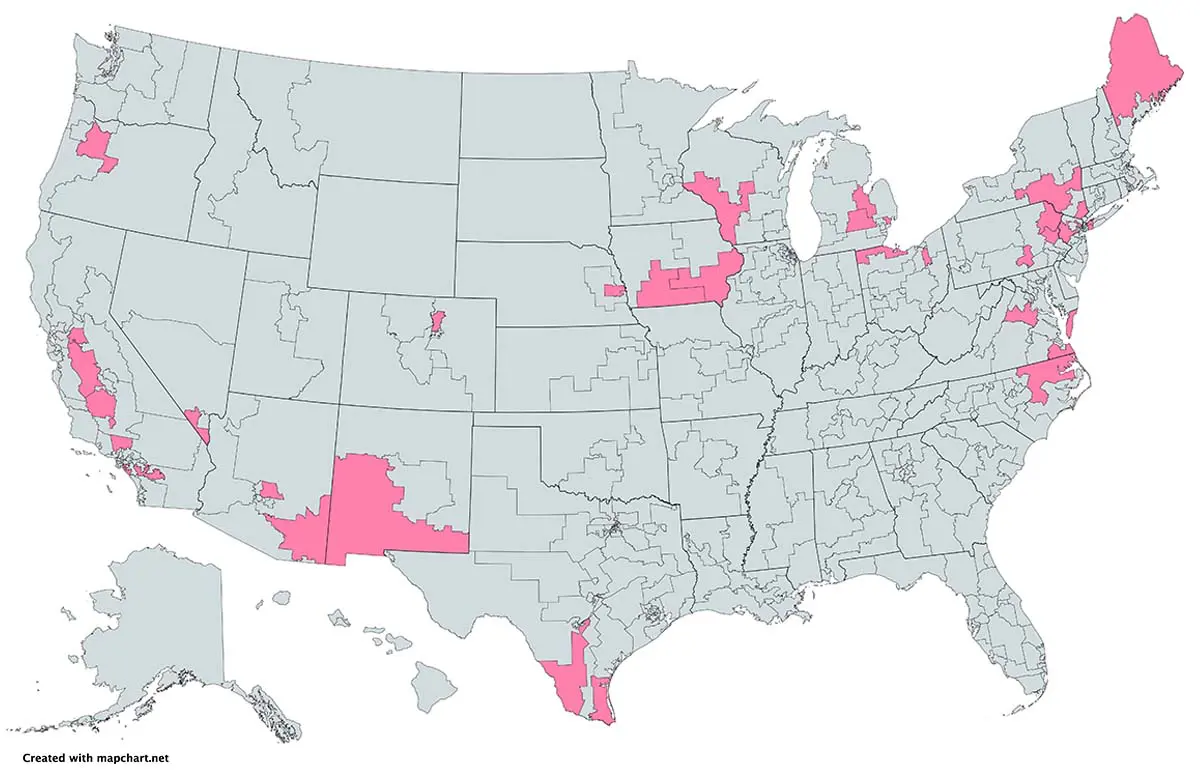
Key US House Races
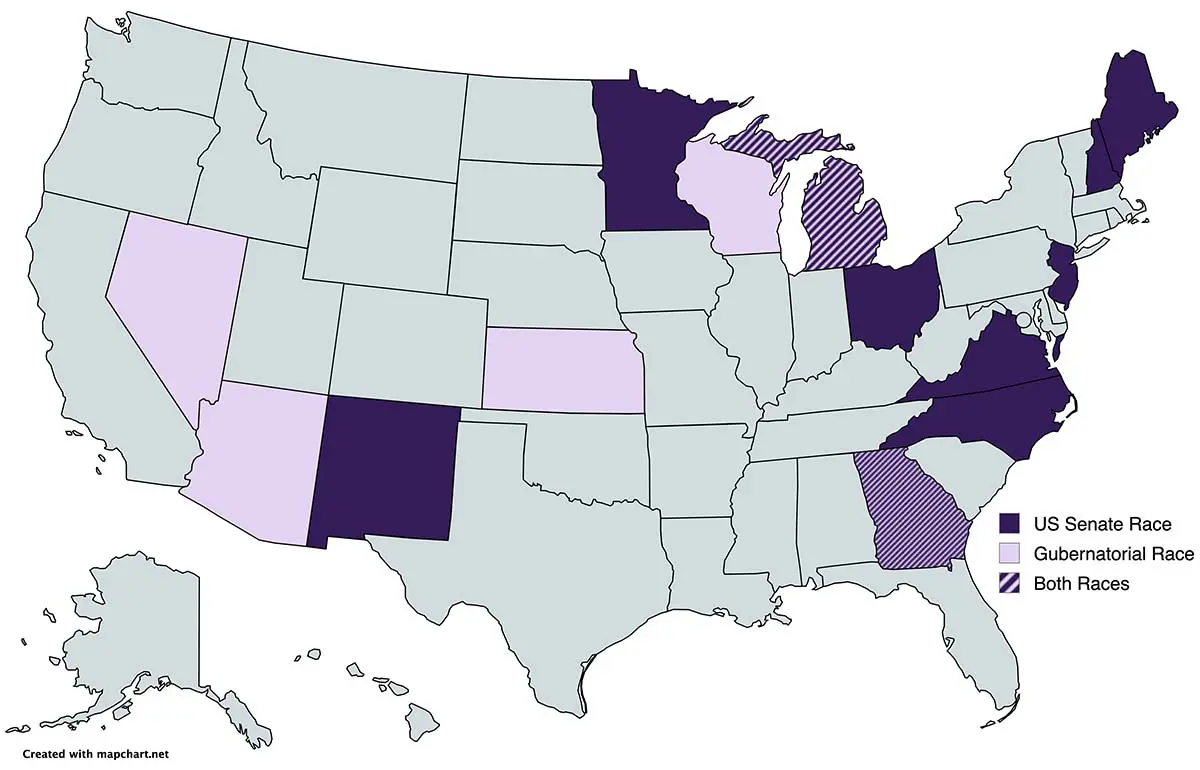
Key US Senate and Governor Races
- In 2025, Virginia and New Jersey have competitive elections for governor.
- In 2026, key governor races in Arizona, Michigan, Wisconsin, Kansas, Georgia, and Nevada will be crucial in determining the balance of power at the state level.
ACTION: Learn about your voting laws.
Voting laws can change from election to election, so staying informed is crucial.
- Learn the voter registration laws in your state, especially any changes since the last election.
- Invite a Board of Elections representative to speak to your group about new voting laws and walk through the voter registration process.
- Learn about Voter ID requirements where you live and how you can help others obtain the proper documentation.
ACTION: Learn about the candidates.
After the filing deadlines have passed, shift your focus to the candidates running in the primary and general elections. To explore what’s specifically on your ballot, check out BallotReady — a helpful, nonpartisan tool that breaks down candidates and issues in a clear, accessible way.
- Invite candidates to meet with your group, keeping these do’s and don’ts in mind.
- Attend local or online candidate forums.
- Review candidate websites and voter guides.
- Host a ballot party — in person or online — to research your ballots together.
ACTION: Learn about ballot initiatives.
Twenty-five states and Washington, D.C. allow citizen-initiated ballot measures, but only 18 states permit citizen-initiated constitutional amendments. The National Conference of State Legislatures maintains a database of statewide ballot initiatives.
- Find out if your state allows ballot measures or constitutional amendments.
- Look into whether there are existing efforts to get initiatives on the ballot in your state. Having relationships with coalition partner organizations will help with this.
- Determine which initiatives you want to support (and even help gather signatures to help get on the ballot) and which you will want to fight against.
A note about the trusted, nonpartisan election resources we’re sharing:
- BallotReady provides comprehensive, personalized information about every candidate and issue on your ballot and details on how to host a ballot party.
- The Cook Political Report provides independent, nonpartisan analysis of federal and state elections, sharing expert insights on competitive races and political trends.
- The League of Women Voters is a nonpartisan nonprofit organization that provides voters with trustworthy election information and advocacy resources.
- Vote.org helps you register to vote, check your registration, and stay updated about state voting laws.
- Vote411.org — from the League of Women Voters Education Fund — provides personalized election information, including candidate profiles and polling locations.
- USA.gov is the U.S. government’s official web portal that makes it easy to find state and local election information.
- The National Conference of State Legislatures provides in-depth data about state ballot initiatives and national legislative trends.
- Voteriders.org informs and helps citizens to secure their voter ID and provides ID education and assistance efforts.
Links to these organizations can be found at the bottom of this web page.
Learn About: Advocacy
Keep in mind that many members may have never done any form of outreach to their representatives, so this could be a new experience! Maybe it’s YOUR first time too! Be kind to yourself and encouraging and supportive of others, keeping in mind the real difference your group can make if you act together.
ACTION: Learn about successful advocacy and pressure campaigns from the past.
The environmental movement of the 1960s and 1970s led to the creation of the Environmental Protection Agency and the Clean Air and Clean Water Acts. The Americans With Disabilities Act in 1990 would not have happened without local groups persistently engaging with legislators. Your group can learn together and utilize proven approaches in your activities.
- Read and discuss a book about grassroots movements that changed the world. A couple of good ones are The Sum of Us: What Racism Costs Everyone and How We Can Prosper Together by Heather McGhee and No Shortcuts: Organizing for Power in the New Gilded Age by Jane McAlevey.
- Watch a documentary film featuring effective advocacy. Some good ones include The Death and Life of Marsha P. Johnson, 13th, Knock Down The House and the more recent film, The Fight.
- Bring in a speaker to share knowledge — this is a great way to learn about potential coalition partners.
ACTION: Read, share, and discuss smart (and vetted!) news sources to stay up-to-date.
The landscape is changing quickly, so your group may want to talk about recent events and where you can take action.
- Heather Cox Richardson’s daily newsletter, “Letters from an American,” is a great way to stay informed and learn important historical context.
- Other thought leaders and experts to follow — all of whom have been part of Red Wine & Blue programming — include:
- Chop Wood, Carry Water by Jessica Craven
- The Brown Girl’s Guide to Politics by A’shanti Gholar
- News Not Noise by Jessica Yellin
- The Preamble by Sharon McMahon
- The View From Rural Missouri by Jess Piper
- Erin In The Morning by Erin Reed
- Joy-Ann Reid’s Substack
- Angela Rye’s Substack
- Abortion Every Day by Jessica Valenti
ACTION: Be Your Own Schoolhouse Rock and Learn Civics.
Most people are unaware of the responsibilities of various branches of government — especially the local ones, such as school boards. Including ongoing civics education, even in small doses, will help your group’s knowledge base expand.
- Host a book reading and discussion on Scholastic’s Guide to Civics: How America Works, Understanding Politics & Government, or Building Better Citizens: A New Civics Education for All.
- Check out Red Wine & Blue’s civics training. Here’s a playlist that is regularly updated with new trainings!
- Read and discuss articles written for the express purpose of civics education. There are a few websites that regularly provide these kinds of articles, including R Discovery and CSIS.
- Take an online civics course as a group! Civiced has been producing content to teach you civics since 1965.
- Encourage group members to stay informed and engaged by requesting a Civic Calendar or Pocket Constitution.
- Invite your elected representatives to attend a meetup to share what their office/branch of government does.
ACTION: Educate your group on effective advocacy tactics.
Some advocacy methods work better than others, so spend some time learning which approaches lead to the best results. Keep in mind that civic engagement is a long-term effort, and meaningful change may take time.
- View and discuss one of TroubleNation’s advocacy training videos, such as this one about how to have effective conversations that help you achieve your goals.
- Kick off your next meetup with a short video explaining why advocacy works. Check out a few great examples in the Additional Resources section below — from two rockstars who are getting it done.
- For a more in-depth look at what you can do, check out Alexandria Ocasio-Cortez’s video in the Additional Resources section below.
- A great book for advocacy groups is Organizing for Social Change by Midwest Academy.
- Invite a speaker to come to your next meeting and talk with the group. Possible sources include representatives from the NAACP, Southern Poverty Law Center, and the ACLU, if there are offices in your area.
ACTION: Learn how to “Power Map.”
This tool has been used since the 1980s in advocacy and campaigning to identify the individuals and groups who can most influence an issue. The Commons Library can teach you how to apply it to your own work. They are an online library for those interested in social change, activism, advocacy, and justice through collecting and sharing resources from around the world.
ACTION: Educate yourself on pending legislation and policies.
- Track legislation and pending policies. Sign up for email updates or legislative calendars (especially at the state level) to receive updates on bills, committee meetings, and votes. American Pride Rises has a tracker specifically for Diversity, Equity, and Inclusion-related bills in each state.
- Review agendas for school board, city council, or commission meetings — they are typically posted online before scheduled meeting dates.
- Decide which branches your group will focus on and identify a member to do a report-out using your identified resources and news.
ACTION: Celebrate Constitution Day.
September 17 is designated as Constitution Day and Citizenship Day. Hosting Constitution Day activities within your group or for your community will help prioritize the fight for our democracy.
- The National Constitution Center has many resources you can use to celebrate the day. They serve as America’s leading platform for constitutional education and debate, providing information about the U.S. Constitution on a nonpartisan basis to increase understanding of the Constitution among Americans.
- The National Archives are the nation’s record keeper and provide some great resources to promote civic literacy and engagement.
Get Involved: Elections
Every election provides an opportunity for your group to take action, and every state has important races at the local level every year. Local elections are where you have the most leverage because they can be won and lost by so few votes. And by focusing on local elections in 2025, you’ll be better prepared for the 2026 midterms.
Once your group is educated on what’s on the ballot and at stake, you can mobilize and take action.
ACTION: Host a house party.
You can host a gathering of folks to talk about a specific race or candidate — and you don’t need the candidate there to do it. This is a great, relational way to get the word out about who you support and why. Hosting doesn’t have to be complicated, and our hosting toolkit will help. Be sure to allow time for attendees to enter their contacts into Rally and complete a few actions!
ACTION: Create and distribute your own voting guide.
Nobody knows your local area like you do, so who better to research candidates and let people know what they stand for? Divide the candidates and races among group members, gather information, and assemble your guide. Think about what YOU would want to know about the candidates and races before going to vote.
ACTION: Work on ballot initiatives.
There may be opportunities to collaborate with other groups or take the lead in supporting ballot initiatives. Since the overturn of Roe v Wade, women-led groups have successfully organized to gather signatures to place reproductive freedom on the ballot and turn out voters. Many groups came together in coalition to make these wins possible!
Other important issues — such as a statewide ban on book bans or commonsense safe gun storage — could also be addressed through citizen-led initiatives.
If citizen-led initiatives are allowed in your area, this RWB explainer can help your group get one on your ballot. The strategies shared are broad enough to support a range of causes — whether you’re working to pass an initiative you support or organizing against one you don’t.
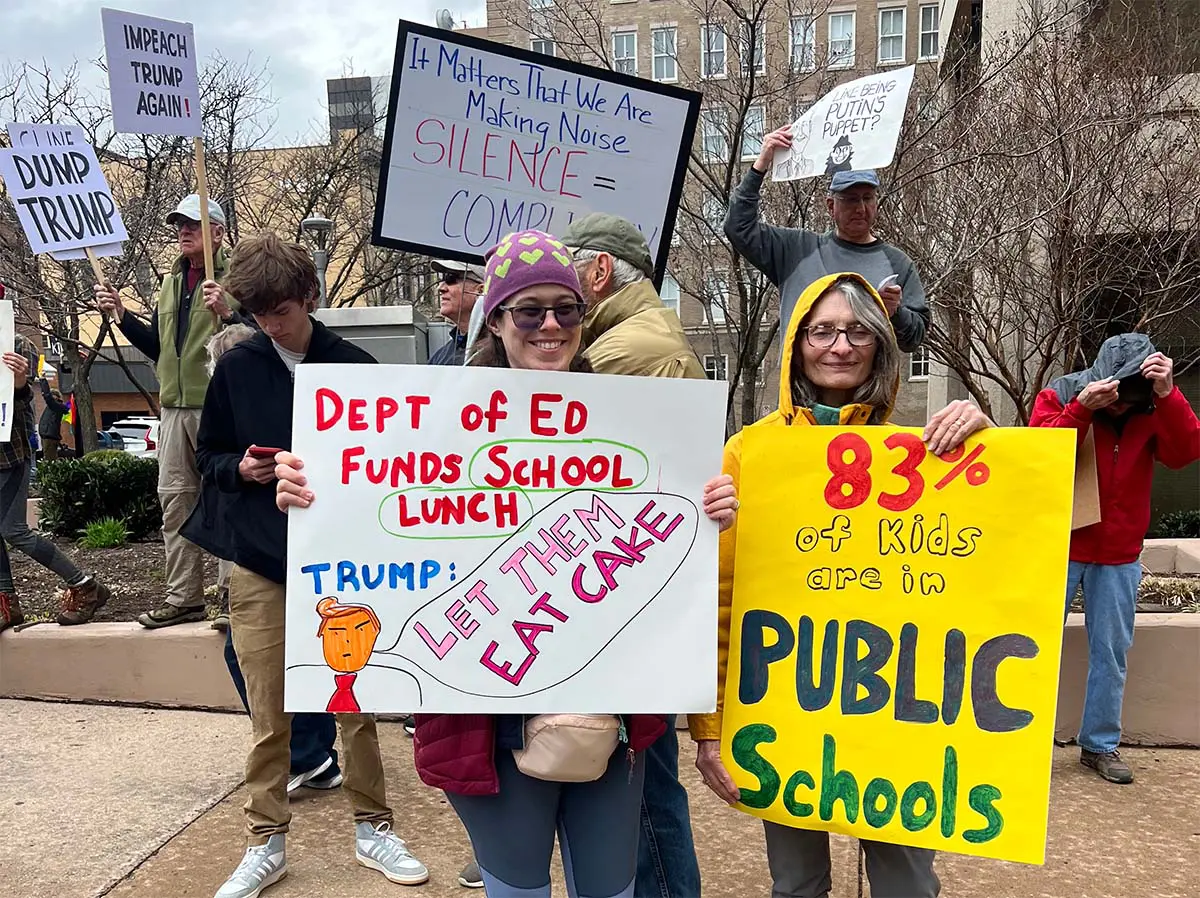
Roanoke Social Circle, a Virginia TroubleNation group, holds its own ‘town hall’ every Monday outside Congressman Ben Cline’s office
ACTION: Register voters.
There are always people who need to register for the first time or update their voter registration for residence changes or other reasons. You can do this through:
- Relational organizing — you’d be surprised how many people you think are registered actually are NOT! You can use Rally to look up anyone to find out if they are.
- Tabling at community events to reach new voters.
- Partnering with organizations and campaigns that can direct you to areas with likely unregistered voters.
- Learn about ID requirements and help supporters in your community obtain the proper documents to vote.
Pro Tip: Be sure to check your state’s election laws before starting, as rules for voter registration vary widely.
ACTION: Host a town hall — with or without your representative.
If your elected official refuses to hold a town hall, your group can form a coalition to host an “Empty Chair Town Hall.” This bold move shines a light on their absence and sends a clear message: our community expects answers and deserves to be heard.
- Partner with other groups — they can share the workload and expand your reach!
- Invite a wide range of community members to bring in fresh voices.
- Provide an opportunity for people to share their stories.
- Collect questions for the absent representative — and make sure they know what they missed.
- Get inspired by previous efforts; Indivisible has some excellent resources. Indivisible is a nonpartisan organization comprised of grassroots, local groups across the country with a track record of hosting empty chair town halls for years.
ACTION: Be a poll worker or poll volunteer.
Elections need well-trained, honest, dedicated workers. Between primaries and general elections, Early Voting, and on Election Day, workers are always needed. Your Board of Elections will have information about those paid opportunities. If you would like to volunteer as a poll greeter or observer or drive voters to the polls, connect with local organizations that are always looking for volunteers.
ACTION: Gather a group to go to the polls together.
If you can park and walk to a polling site, get together to make signs first, then “march” to the polls and cast your ballots. If you can’t walk, meet up at a central place and get in line to vote together. Afterwards, go grab coffee or drinks and celebrate your participation in voting.
ACTION: Run for office.
What better way to engage civically than by running for office? While this may not be everyone’s cup of tea, you might have a group member who would like to serve in elected office but isn’t sure how to get started. Organizations that can provide guidance include:
- Vote Run Lead
- Emily’s List
- Win With Black Women
- Run for Something
- She Should Run
- Emerge America
- State-based groups like LEAD Ohio, LEAD PA, Great Lakes Political Academy (MI), Lillian’s List (NC), We the People for Education (VA)
ACTION: Create social media graphics for local candidates you support.
Smaller campaigns often don’t have the resources to create high-quality visuals, so this is a great way to help. Tools like Canva make it easy. If you have photos of group members with a candidate, be sure to use those!
ACTION: Host a “Reality of Project 2025” event.
Now that Project 2025 is being implemented, we need to sound the alarm about how it’s impacting our local communities. People who know about it do not support it — or the politicians putting it into action. Use RWB’s Project 2025 Tracker to help connect the dots from the playbook to reality (you can print straight from the website). Then, plan an event in your community on the TroubleNation platform.
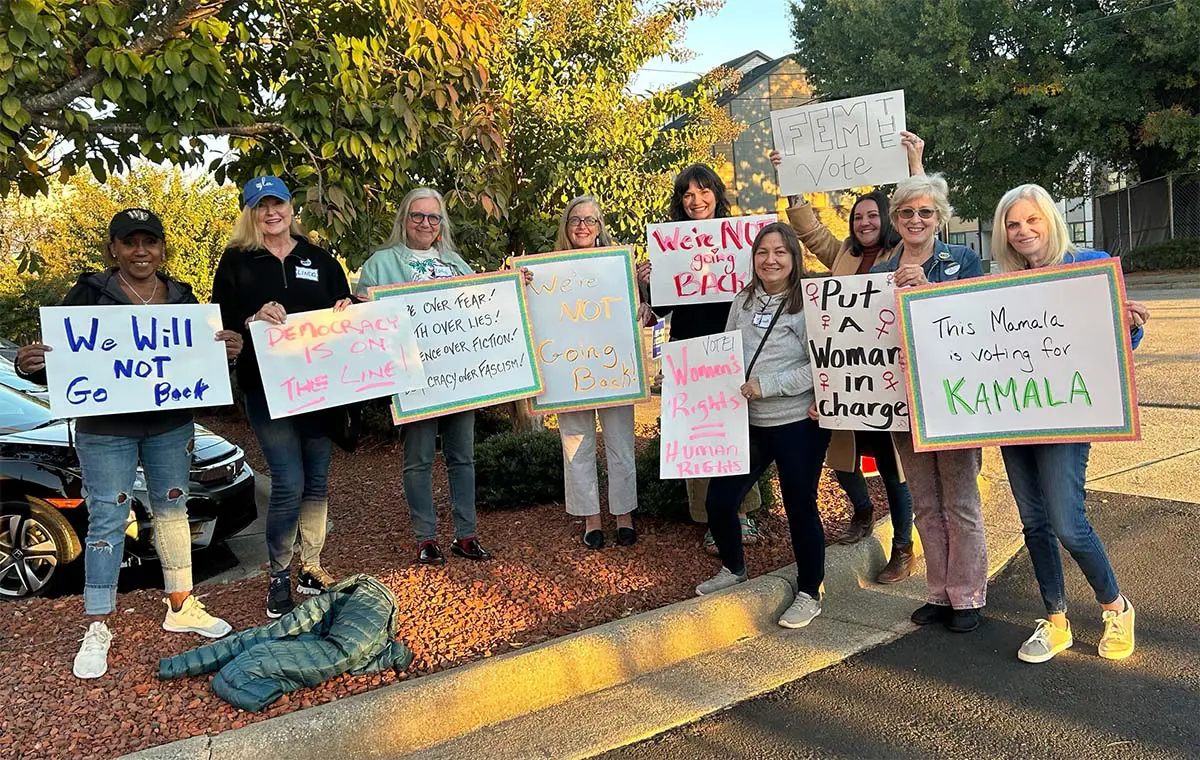
Get Involved: Advocacy
Get your group together to discuss advocacy work they’ve done in the past. Lots of experience? Great! Totally new to this? Not a problem! Share experiences, approaches, inspiring success stories, and aspirations. Discuss what activities feel compelling and feasible for your group. For example, if you live four hours from your state capital, showing up there for rallies and advocacy days may be difficult, whereas making calls and visiting the field offices of your elected representatives may be more realistic.
“Civic engagement is a relationship, not an action.”
ACTION: Build relationships with your representatives.
Staying in touch with the people elected to represent your community at the federal, state, and local level is a huge part of advocacy. But you don’t have to build them all at once. Decide who you want to start with based on an issue they work on that you’re passionate about.
- Invite them to attend your meetups for Q&A about their work.
- Encourage them to hold community town halls (offer to help with the logistical parts, such as working the door or handing out agendas).
- Share the work your group is doing and how you are focused on improving the community through calls, visits, and emails.
ACTION: Hold them accountable.
Our elected officials work for us — so let’s remind them! Speaking up about the votes and positions we expect them to take, and calling them out when they fall short, is how we make our voices heard. If your group is new to this kind of advocacy, start with the basics:
- Contact your elected representative. It’s a much more productive use of time to contact the elected officials who represent YOU. Some representative offices will not take down comments unless you are a constituent. So focus your energy on your own representatives, up and down the ballot. (One exception? Local governing bodies — like a school board — where writing to all members makes sense.)
- Prioritize the best ways to make your voice heard: visit, call, then write. There are many ways to contact elected representatives, but some are more effective than others.
- Personal visits – Nothing beats showing up in person! Face-to-face visits with your representative or their staff is the most optimal form of advocacy. Consider visiting field offices if your representative’s main office is too far away.
- Phone calls – Next best thing after a visit. Calls do get tracked — so even leaving a voicemail counts. (And don’t worry, you can always call after hours if you’re phone-shy!) Experts suggest that extremist groups make calls at a much higher volume than the average busy woman. But we can change that! Apps like 5 Calls make this very easy with scripts and phone numbers built in. Watch your email for actions from Red Wine & Blue as well. For critical issues, we’ll send you an easy way to take part. In April 2025, for example, we drove thousands of members of our community to call their Senators demanding they vote NO on the SAVE Act.
- Emails, texts, postcards, letters – Written communications still matter, but they are much easier to delete or throw in the trash. If you go this route, make sure your message is original and personal. Staffers can spot a generic message a mile away!
- Reach out regardless of party. If your representative never votes your way, or conversely, always votes your way, you may think, “Why bother contacting them?” But they need to hear from you to understand what their constituents really want. Representatives use calls to measure enthusiasm and see how much momentum is building around a certain issue. Let extremist politicians know you’re watching and holding them accountable, and let those who share your values know you support them.
- When to get LOUD about specific legislation and votes. There are four main moments when your messages matter most: when legislation/policy is first presented, when it’s being discussed, when it’s being voted on, and when it’s passed/failed after voting. Use each one as an opportunity.
- Encourage others to reach out, too. Advocacy works best when many people are doing it. As your group members engage in regular outreach, ask them to invite others to the activity. Not only will you have more callers doing the work — you may also recruit more group members as a result.
ACTION: Meet regularly with your local representatives.
School board members, county commissioners, city council people, and town council people are all fair game for meeting up with your group.
- Organize a coffee shop meet-up once a month and invite your representative to attend.
- Schedule a small group (whatever size their office can accommodate) to visit them at the office regularly.
ACTION: Compile weekly actions for your group to take.
Not sure what you can do? Subscribe to Rogan’s List and receive daily “to-do” emails full of very specific actions that you can share out to your friends, family, and group members. Establish yourself as the go-to person for actions, and before you know it, you’ll have a community of folks creating the collective impact that’s needed.
ACTION: Create legislative flash cards.
When doing regular outreach to your elected representatives, it’s helpful to have key information handy. That’s why having your group gather information and create a set of flashcards that everyone can access is helpful. This idea came from Good Trouble WNC TroubleNation group member, Mary Graden!
- Ask group members to divide up the names of the representatives for your area.
- Use these flashcard instructions and template to compile information.
- To build flash cards for all of your state representatives and congresspeople, partner with other TroubleNation groups in your state.
ACTION: Host or join a legislative advocacy day.
Legislative advocacy days are powerful ways to advocate for the issues you care about and build relationships with your state representatives (and their staff — legislative assistants can be your secret weapon).
- Pick a date and rally your group.
- Call ahead to schedule meetings with your representatives. If you’ve used our template to create legislative flashcards, this info will be easy to find!
- Come prepared with a clear ask (a vote, policy stance, or issue), personal stories, and any petitions you’ve collected.
- Take photos with your representatives at the end, thank them for their time, and let them know when they will hear from you next.
Watch Red Wine & Blue’s training on how to plan and host a legislative advocacy day.
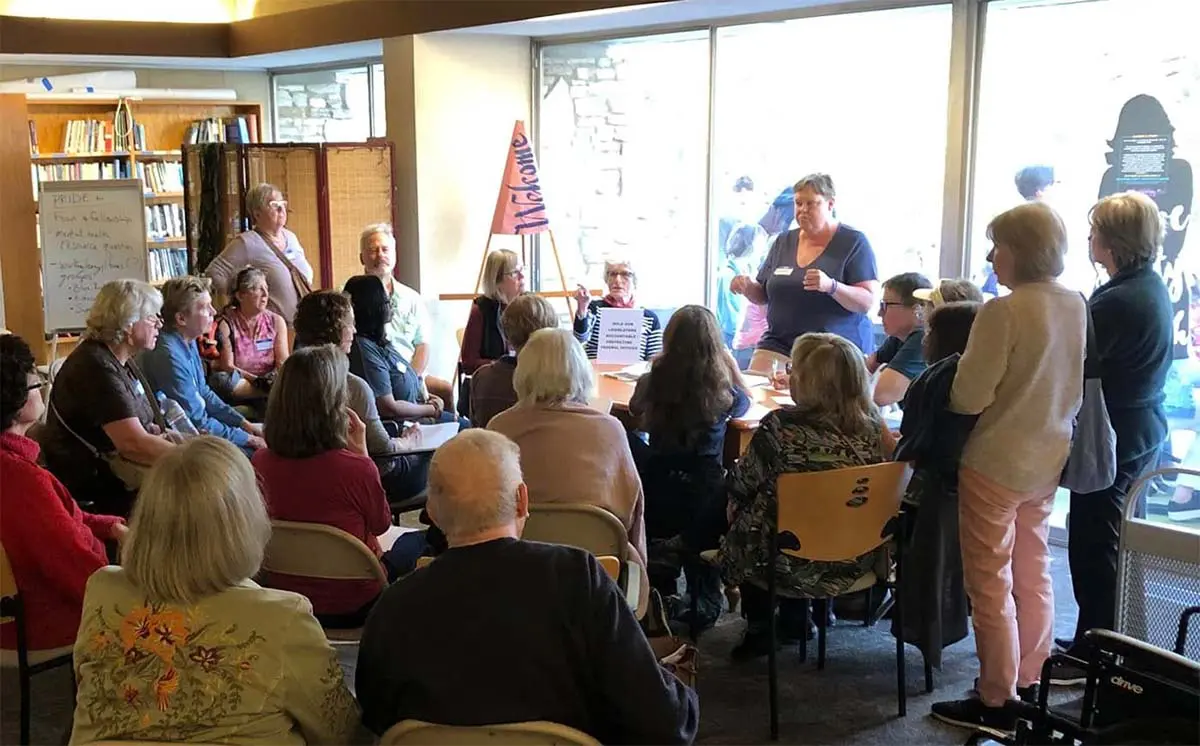
Legislative Flashcard creator, Mary Graden, of Good Trouble WNC
ACTION: Participate in the Card Campaign.
This turnkey program takes postcarding to a new level. It provides a way to get the word out about threats to democracy and legislation we should all know about, such as the SAVE Act, in innovative ways that both introverts and extroverts will appreciate. Check out the distribution guides for how to get important messaging into the hands of the public. Heather Cox Richardson is a fan of this program!
ACTION: Spread the word about how your representative voted.
Most people don’t keep track of how their elected representatives vote — but your group can change that by creating and sharing social media content.
- Use Canva for quick-to-create graphics.
- Create a post using Facebook’s colorful background tool (130-character limit), take a screenshot, and share it across other social media platforms.
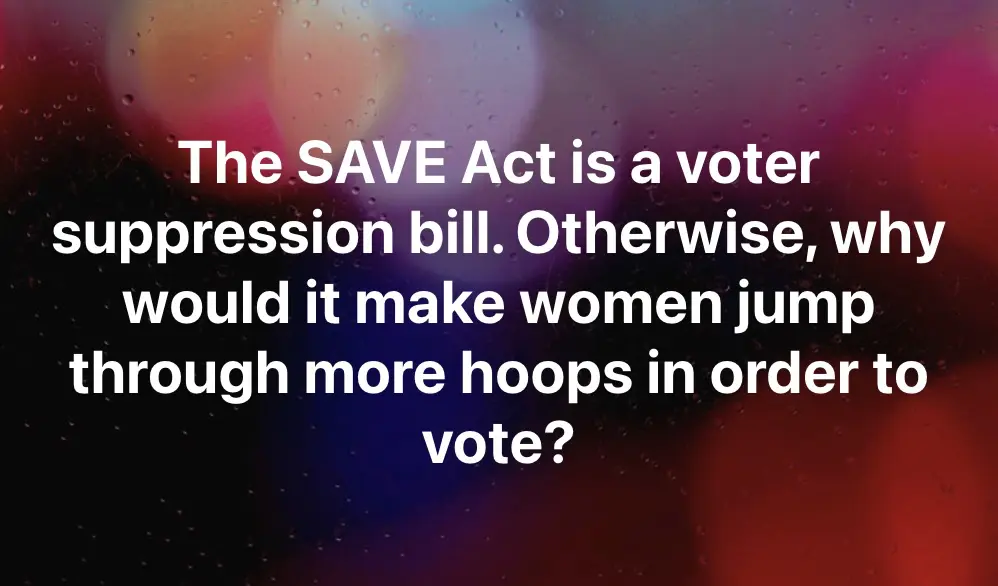
Here’s an example of a post created using Facebook’s colorful background tool.
ACTION: Generate local press to get your representative’s attention.
One of the most effective ways to hold elected officials accountable and shape public perception is through local media. Think: newspapers, online outlets, even your community’s alternative weekly.
- Write letters to the editor – not every letter gets accepted, but persistence pays off. Once you’ve had a letter accepted, it’s often easier to get future letters in.
- Submit editorials — for those who enjoy writing and feel they have a lot to say, submit an opinion piece.
- Tell real stories of people in your community. Personal stories are more powerful than statistics.
Pro Tip: Learn more about how to write letters to the editor and op-eds from Red Wine & Blue’s TroubleNation Training: How to Write Op-eds and Letters to the Editor.
ACTION: Make a public records request.
Sometimes, the most powerful thing we can do is shine a light on what’s happening in our local government. Public records are your right — and accessing them can bring transparency to issues that impact your community. This Red Wine & Blue training will walk you through the process.
ACTION: Create and circulate a local petition.
When it comes to local issues, petitions can make a big impact. They are a great way to show local leaders exactly how many people are paying attention — and expecting action.
You’ve got a built-in petition tool right on your TroubleNation landing page — it’s easy to use and gives you a link to share so people can quickly sign on.
Once a petition has ended, you can download a printable PDF to deliver signatures in person or send an electronic version by email.
- Alert the media and invite them to cover the day you deliver it.
- Take photos and videos of the delivery and share them on social media.
- Pick the right issue — like a school board policy, a frustrating move by your county commission, or push for a new city ordinance.
ACTION: Be a School Board Advocate.
School boards are one of the most local forms of government. Students, educators, administrators, bus drivers, cafeteria workers, and of course, families are all affected by their decisions. Public education is in the line of fire at the federal, state, and local levels with defunding, private school vouchers, book bans, attacks on LGBTQ+ students’ rights and the teaching of accurate and honest history, and the list goes on.
The good news is that you and your group can have the most impact at the local level, where even a small number showing up to speak out at a meeting can change the way board members vote – and organizing can remove extremist board members at election time.
- Start by downloading RWB’s Parent Playbook and getting copies out to your group members.
- Train up your group by watching some of RWB’s public education trainings, such as this one.
- Learn how to counter the parents’ rights crowd with effective messaging.
- Explore what culture wars are costing our schools — not only the mental toll on students and educators, but also the financial impact — with RWB’s The Costs of Conflict.
- ACTION: Bring attention to book bans by hosting a Read-In, a fun, positive, family-friendly event that celebrates banned books, honest education, and accurate history.
- Listen to a podcast series, such as RWB’s The Cost of Extremism, which takes a deep dive into issues facing many of us and meets the women fighting back.
You ARE the media when it comes to your school board. You will be the ONLY source of good information for school board races and candidates for many people you know. Everything you share matters because usually, no major media outlets are covering it. And your school board members are watching. Making a public comment, sharing a message on social media, sending an email to a board member, or writing a letter to the editor of your newspaper are all examples of ways to amplify a pro-public education message.
ACTION: Show up for community meetings.
The more your community sees and hears from you, the more you build relationships with leaders and lawmakers, and the more influence you’ll have! When you show up consistently, people take notice. Here’s how to make your presence count:
- Attend government meetings — school boards, town or city councils, county commissions as a group. Wear matching T-shirts if you have them, or pick a unifying color. Sit together so your presence is unmistakable.
- Speak up during public comments on the issues you care about. Not sure how to make your voice heard? We’ve got a TroubleNation training to help you become a confident, effective speaker.
- Join local government committees — they’re a great way to learn how decisions are made, get to know the key players, and influence policy from the inside.
- Gather outside before the meeting, then head in together as a group to show that your community is engaged and paying attention.
ACTION: Host Banned Book Bingo.
Many people don’t realize just how close to home book bans are until they directly affect their local school or library. And once they find out, they’re often ready to get involved. Hosting a fun and eye-opening event like Banned Book Bingo is a great way to raise awareness and send a clear message to school board members and legislators who are deciding whether certain books belong on the shelves. Here’s how to make it meaningful:
- Feature books that have been banned or are being challenged in your community.
- Give away banned books as prizes. TroubleNation groups can request free boxes of books to hand out at your event.
- Invite a local author whose work has been targeted. Red Wine & Blue partners with Authors Against Book Bans and can help connect your TroubleNation group with an author in your area to speak or participate.
Additional Resources: Taking Back Power
USA.gov for state and local election info
Cook Political Report for key races
Voter registration rules
Voting law changes by state and candidate websites
Voter ID requirements
BallotReady to learn what’s on your ballot and host a ballot party
Nonpartisan voter guides
National Conference of State Legislatures ballot measures database
States allowing ballot measures
States allowing constitutional amendments
Letters from an American by Heather Cox Richardson
Chop Wood, Carry Water by Jessica Craven
The Brown Girl’s Guide to Politics by A’shanti Gholar
News Not Noise by Jessica Yellin
The Preamble by Sharon McMahon
The View From Rural Missouri by Jess Piper
Erin In The Morning by Erin Reed
Joy-Ann Reid’s Substack
Angela Rye’s Substack
Abortion Every Day by Jessica Valenti
R Discovery for civics education
CSIS for civics education
Civics 101 podcast
Online civics course from CivicEd
Request a civics calendar
Request a pocket constitution
Why advocacy works video from Jess Craven
Why advocacy works video from Michigan State Senator Mallory McMorrow
What you can do video from Congresswoman Alexandria Ocasio-Cortez
The Commons Library: how to power map
Tracker for Diversity, Equity, and Inclusion-related bills by state
Resources for Celebrating Constitution Day
Civics and Constitution Day resources
Learn about voter ID requirements
Past empty chair town hall efforts
Resources for hosting a town hall
Vote Run Lead
Emily’s List
Win With Black Women
Run for Something
She Should Run
Emerge America
LEAD Ohio
LEAD PA
Great Lakes Political Academy (MI)
Lillian’s List (NC)
We the People for Education (VA)
Canva for social media graphics
5 Calls app for outreach to your elected representatives
Rogan’s List
Legislative flashcards instructions
How to use the Facebook tool to create simple social media messages
The Card Campaign postcarding program
